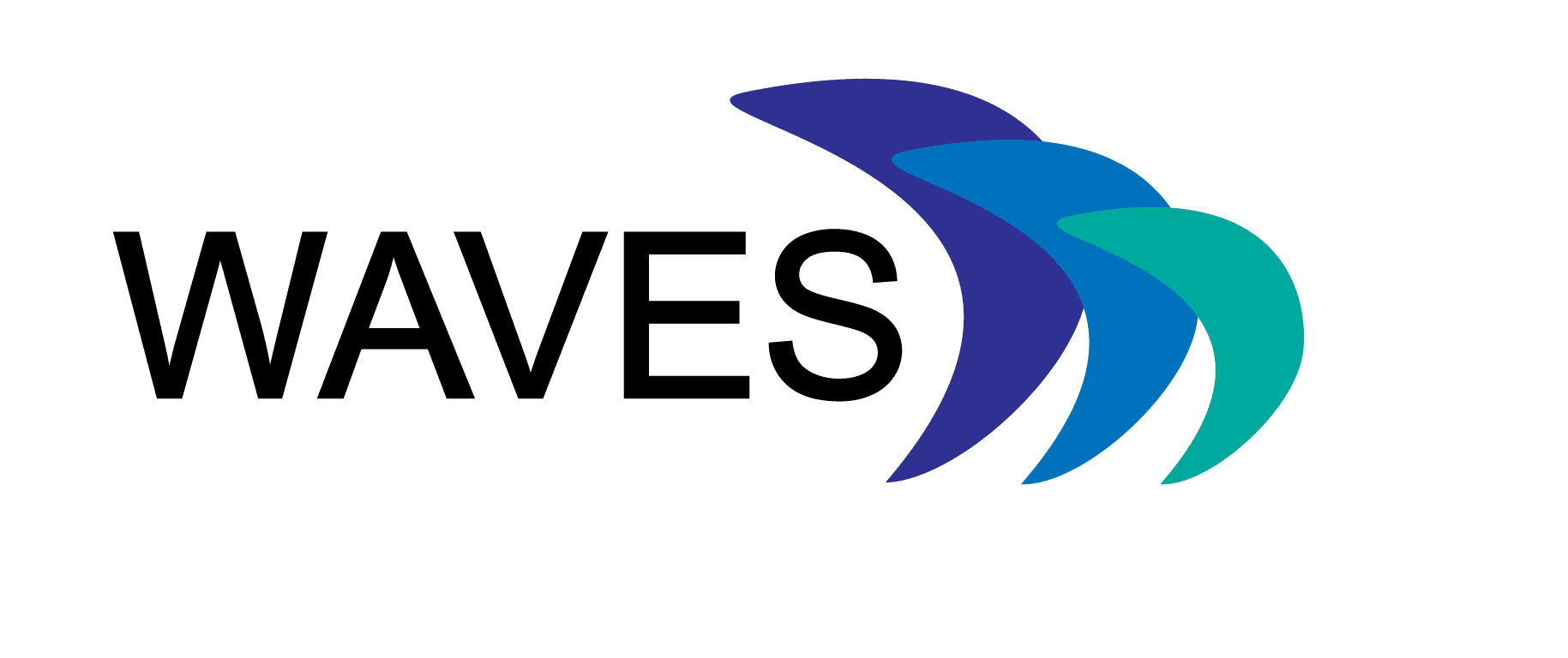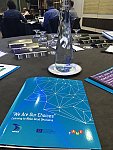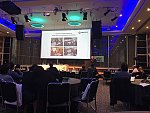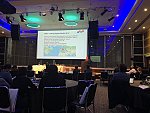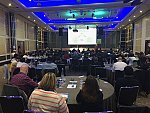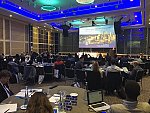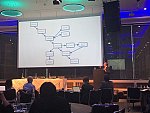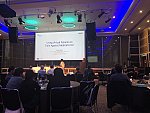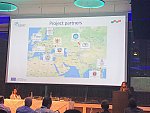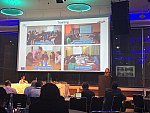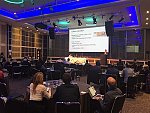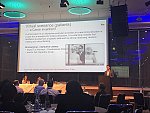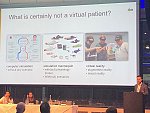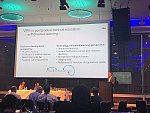The second WAVES Network event We are our choices: Learning to Make Good Decisions was held on 24th October 2018 in London, UK. The event welcomed national and international participants, involved in the WAVES Network, and those interest in using Scenario-Based Learning for training and teaching.
The event provided a great opportunity for participants from business and academia to connect and engaged with the community. A variety of presentations, keynote speakers and interactive sessions were delivered on the day to edify participants and offer know-how expertise on Scenario-Based Learning.
Presentations and sessions
Below are the presentation recordings and abstracts (see conference programme)
Welcome and Overview – Sheetal Kavia, eProjects Manager, and Professor Jenny Higham, Principal from St George’s University of London
The Impact of Our Journey with Virtual Scenarios – Professor Terry Poulton, Professor of eLearning in Medical Education, St Georges, University of London
Following the early development of VP author/players, the eViP European programme promoted the importance of the virtual patient standard, and its members inspired the search for better and more interactive authoring tools. This presentation will focus on the more recent developments and grant-funded programmes across the Eurasian continent, reporting on the outputs from four major European-funded programmes over the last 6 years involving 29 funded partners, and many more associate partners. It will consider the range of outputs by each programme viz curriculum transformation across 6 institutions in ePBLnet, the experiential impact of VP training in Croesus, and a randomised trial of the impact of interactive Virtual Patients on educational performance in TAME. Finally, the impact of the capstone project, ‘Widening Access to Virtual Patients’ (WAVES) will be considered in drawing together this network of participants from nine linked projects - past, present and yet to come - into a community of practice across Northern Europe, Western Europe, the Caucasus, Central Asia, Eastern Europe, China and SE Asia.
Keynote Presentation: Scenario-Based Educational Software – From its Roots in Academia to Global Commercialization – Dr James B. McGee, Assistant Dean for Medical Education Technology, University of Pittsburgh
Dr. McGee spent the last twenty-two years developing scenario-based software and promoting its use in healthcare education and training. Starting with an idea at Harvard, then growing his virtual patient software at the University of Pittsburgh and eventually forming a company to sell and distribute outside of academia. Many lessons were learned about innovation, technology, working with business and actually making a profit. Not all was as predicted. In this presentation Dr. McGee will share his experience developing virtual scenario education while promoting and supporting scenario-based learning from the perspective of both a full-time academic and a participant in the for-profit commercial world.
Widening Access to Virtual Educational Scenarios – Sheetal Kavia, eProjects Manager, St Georges, University of London
Virtual Scenarios are resources used to deliver scenario-based learning in many different learning settings and styles. The WAVES project brings together 6 different organisations from across Europe to share their experience and knowledge on the use of Virtual Scenario. Together with a wider community of organisations within the WAVES Network this information is shared via a two-part toolkit. The community is growing and evolving with new projects and research.
Training Against Medical Error (TAME) - Trupti Jivram, eLearning Manager, St George’s, University of London
In education learners are taught to carry out procedures and processes in the right way. However, we do not always teach them how to avoid error or even mention errors which are commonly made in the workplace. Through the TAME project a number of institutions from Kazakhstan, Ukraine and Vietnam implemented training against medical error virtual scenarios in their curricula following the example from St George’s University. Key staff in each institution were then trained to author their own Error virtual scenarios to implement into modules within their curriculum.
Virtual Patients Enhancing Lifelong Learning in Urology and Oncology – Daniel Schwarz, Associate Professor, Masaryk University
Lifelong learning of physicians in Czechia is organized by professional medical associations receiving significant support from pharma and biotechnology industries. Despite the delayed onset of technology-enhanced learning, there have been several e‑learning projects and online platforms for case-based learning launched recently. “Renal carcinoma and virtual patients” (ca-ledviny.cz) is a new project aimed at scenario-based learning with all cases associated with this type of kidney cancer. Although the target group involves oncologists and urologists, this educational platform has the potential to become an interesting learning resource for specialists in other medical disciplines as well. The experience from the WAVES knowledge alliance helped to design a sustainable project and to accelerate its early phase.
Virtual Scenarios at Bayer – Peter Brown, Head of Learning Innovation and Design, Bayer Plc
Explore why Virtual Scenarios are used at Bayer to improve the impact of learning that leads to behavioural change. See how Bayer creates Virtual Scenarios using varying levels of investment and richness and find out what our learners think.
Keynote Presentation: Co-designing Virtual Scenarios for Learning – Professor Diana Laurillard, Professor of Learning with Digital Technologies, UCL Institute of Education
The presentation will draw on recent experience in other domains to propose a model for this community to build knowledge about scenario design using digital methods. Building on the techniques already in use in the medical field, it will illustrate the use of a free, open, and online ‘Learning Design’ tool, and a peer-review activity within a MOOC. The design tool embeds the scenario-design guidelines, demonstrates exemplar scenarios, and provides the starter kit for users to customise a scenario design. The MOOC turns this into a collaborative knowledge-building exercise
Sustainability of virtual scenarios and the network – Professor Panagiotis Bamidis, Associate Professor of Medical Education Informatics, University of Aristotle
This is an interactive session to discuss and explore the use of virtual scenarios beyond funding and implementation. How do we sustain the scenarios? What is required to sustain the usability of virtual scenarios in your organisation? What do we want from a Virtual Scenario Network? How can we sustain this network? What do you expect from being part of a network?
Knowledge and Skills Retention of Training Against Medical Error with Virtual Patients: Do Mental Load, Emotions and Initial Academic Abilities Play a Role? – Victor Ricklefs, Vice Rector, Karaganda State Medical University
As part of the TAME project KSMU examined 39 students of Year 5 after PBL with 6 error virtual patient cases in General Practice. The exam included 10 MCQ questions for each case and 6 OSCE stations. MCQ results were compared against 22 students of Year 5 and 18 students of Year 6 of traditional curriculum. OSCE results were compared against 14 students of Year 5. MCQ results depended mostly on initial academic abilities and not on the features of VP case. Students with higher initial academic abilities reported better experience and perceived ability. The higher was the mental load during PBL VP case, the lower were OSCE results. The more talented students experienced more negative emotions during PBL VP.
Systematic review of virtual patients – Andrzej Kononowicz, Assistant Professor, Jagiellonian University Medical College
The Digital Health Education Collaboration is the effort between several universities worldwide to synthesize the evidence on the effectiveness of various forms of e-learning methods used to train health professionals. The presentation will summarise the data collected regarding the impact of virtual patients on knowledge and skills outcomes when compared with traditional forms of education. The findings show that there is low quality evidence that virtual patients are at least as effective as traditional education for knowledge outcomes and more effective for skills outcomes. Significant heterogeneity and methodological limitations of analysed studies lower the strength of conclusions.
Interactive discussion – Luke Woodham, eLearning Technical Innovations Manager, and Trupti Jivram, eLearning Manager, St Georges, University of London
Throughout the day participants will have a chance to ask questions on an interactive board, these questions can be related to general things about the day, specifically on a type of learning resource or specifically on certain topics. The session will look to find the answers to these questions together through conversation, debates and further questions.
Photo gallery
More photos available on the WAVES Facebook page (https://www.facebook.com/pg/WAVESnetwork/photos/?ref=page_internal)
29. 6. 2018
